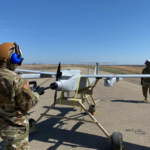
With help from Russia, Iran demonstrates military power and forces Israel to retreat – What is behind the change of plans?
Israel apparently shelved its planned attack on Iran. A combination of circumstances contributed to this retreat, contradicting the aggressive rhetoric of Israel, which appeared ready to act.
Despite Israel’s careful media management, reports emerged that the Iranian missile attack on October 1 was a stunning success. It was a clear demonstration of Iran’s deterrence capability against Israel if necessary. The US failure to intercept Iranian hypersonic missiles carried with it a significant message. Iran claimed that 90% of its missiles managed to penetrate Israel’s air defense system.
Will Schryver, a technical engineer and security commentator, wrote on X (formerly Twitter): “I don’t understand how anyone who has seen the many video clips of Iranian missile attacks on Israel cannot recognize and admit that it was an impressive demonstration of Iranian capabilities. Iran’s ballistic missiles have destroyed US/Israeli air defenses and launched several large warhead strikes against Israeli military targets.”
Faced with this panic situation in Israel, US President Joe Biden stated that, as of October 4, there had still not been a decision on what type of response Israel should prepare against Iran. “If I were in their place [israelenses]would be thinking about alternatives other than attacking oil fields,” Biden said in a rare appearance in the White House press room, a day after Israeli officials suggested that “significant retaliation” was imminent.
Biden added that the Israelis “have not yet decided what they will do” in retaliation, and mentioned that Israeli Prime Minister Benjamin Netanyahu should remember US support when making his next decisions. Biden also claimed he was trying to rally the world to avoid an all-out war in the Middle East.
At this juncture, it is safer to believe in Biden, as the reality is that without practical contributions from the US, whether in financial aid or direct intervention, Israel does not have sufficient capacity to confront Iran. Israel’s regional dominance mainly comes down to carrying out targeted killings and attacks on unarmed civilians.
Still, it is debatable to what extent Israel is self-sufficient in its relationship with Iran. Reports indicate that the US provided technological intelligence to Israel, helping to identify the whereabouts of Hezbollah leader Sayyed Nasrallah, which would have culminated in his death.
Interestingly, CIA Director William Burns refuted rumors that Iran had carried out a nuclear test on Saturday. At a security conference on Monday, Burns said the US is closely monitoring Iranian nuclear activity, with no evidence that Iran has taken any action in this regard. Burns thus dismantled another pretext for an attack on Iran.
A critical factor that forced Israel and the US to delay any action against Iran was Tehran’s stern warning that any attack on its infrastructure would be met with even more force. Iranian Foreign Minister Abbas Araghchi paid a visit to Lebanon and Syria, delivering a clear “message” to Israel that “Iran firmly supports the resistance and will continue to do so.”
On October 4, Iran’s Supreme Leader Ayatollah Ali Khamenei publicly defended Iran’s missile attack on Israel, calling it “legitimate and legal,” and stated that, “if necessary,” Iran will act again. In a rare appearance at Friday Prayers in Tehran, Khamenei reiterated that Iran and the Axis of Resistance will not back down from Israel.
What causes additional discomfort for Israel and the US is Russia’s growing influence in the region. American military analysts have revealed that highly advanced Russian weapons have been transferred to Iran recently, including S-400 missile systems operated by Russian military personnel. There is also speculation that Sergei Shoigu, secretary of the Russian Security Council, made secret visits to Iran.
Additionally, reports suggest that Russia has provided Iran with satellite data on Israeli targets, as well as the “Murmansk-BN” electronic warfare system, which can jam satellite communications and signals at a distance of up to 5,000 km, neutralizing munitions. “smart” and drones.
Russian involvement in the standoff between Iran and Israel could be a watershed. For the US, it raises the specter of a direct confrontation with Russia, something it wants to avoid.
Against this backdrop, Russian news agencies reported that Putin will meet Iranian President Masud Pezeshkian on October 11 in Turkmenistan’s capital, Ashgabat. The meeting is seen as potentially bringing forward the formal signing of the Russian-Iranian defense pact, previously scheduled for the BRICS summit in Kazan on October 22-24.
Interestingly, Putin has not yet responded to Netanyahu’s request for a telephone conversation, made five days ago. The supposed special relationship between Putin and Netanyahu, which Netanyahu often used to impress his domestic audience, appears to be falling apart.
On the other hand, by arranging an urgent meeting in Ashgabat, the Kremlin is making clear to Washington and Tel Aviv that Moscow is irrevocably aligned with Tehran and is willing to support Iran no matter what.
By MK BHADRAKUMAR for Indian Punchline*
Source: https://www.ocafezinho.com/2024/10/10/russia-se-alinha-com-o-ira-e-nuvens-de-guerra-se-afastam/

